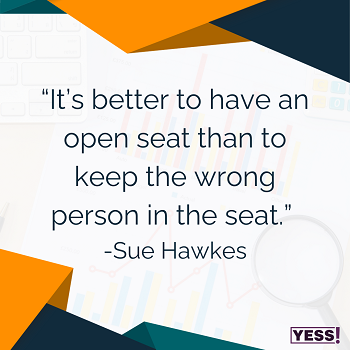It’s better to have an open seat than to keep the wrong person in the seat.
Too many leaders talk themselves into keeping a person who’s doing okay, performing adequately, not performing, or struggling in the seat under the premise that “it’s better than going without someone” or “we have to have someone.”
This is one of the biggest lies leaders tell themselves.
When people suffer in a position long enough, even when they once were a core values match for your team, they become a bad culture fit, negative influence, or worse. Think of putting a bookkeeper in a sales position because we “needed the help” for a trade show. Could they do it? Perhaps for a day or a few hours. Over time, if it were a several-day assignment however, they’d be worn down and a shell of the person they were as a numbers ninja. So, could they do it? Yes. Should they do it? No.
Now imagine your poorly performing person in a job they’re not suited for, coming to work every day to suffer. They’re not performing, and they know it…and so does everyone else. When we keep that person, we also maintain expectations for what we want to be happening that isn’t happening. That gap causes pain for them and everyone around them. Disappointment after disappointment, we diminish all hope – theirs and ours. We erode the best of them and over time, we muscle up the courage and the data to let them go, or worse, we pretend to give them a chance with a Performance Improvement Plan – which is really a “we’re-gathering-information-to let-you-go” plan.
However it happens, this is the lie: having an open seat forces you and your team to figure it out. We all know it strains our capacity, but we don’t pay with the penalties and interest of daily suffering for everyone involved. The pressure to hire comes from managing what we know isn’t going to happen, letting things go – temporarily – and moving through the challenge more quickly.
Bottom line, there’s no easy answer to a wrong fit. You can lie to yourself and others, let the frustration mount, and pay the price every day by keeping someone in a job they aren’t suited for until you build the case or… you can embrace the kindest, fastest way for everyone to win by taking action, and solving for the impact of the open seat in the short term.
Everyone will be better for it, even the person who was struggling in the seat.
